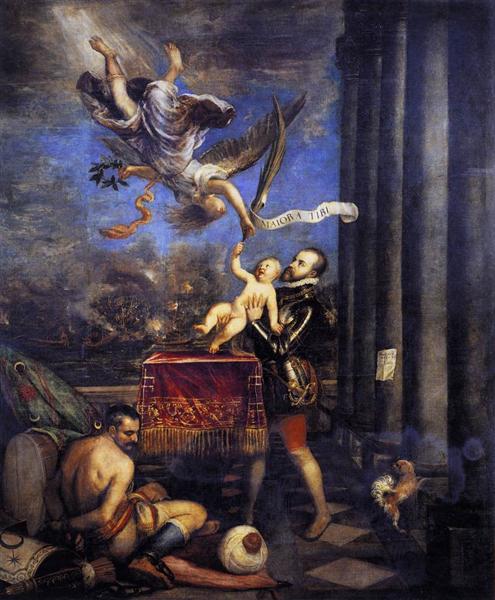विवरण
The work "Philip II Offering Don Fernando to Victory", painted by Titian in 1570, is a magnificent example of the Venetian artist's excellent mastery and his ability to intertwine the reality of his time with a transcendent meaning. Embodying not only the figure of the Spanish monarch Philip II, the painting represents a moment of great political and military symbolism, as well as the representation of the values of an era where glory, war and faith were inextricably intertwined.
In the composition, the elements are arranged in a pyramidal structure that directs the viewer's gaze towards the centre of the work. There, Philip II, portrayed with a majestic bearing, offers Don Fernando, his son, to an allegory of Victory that appears at the top, symbolising triumph. The dynamism of the figure of Victory, with her outstretched wings and imposing attitude, is contrasted with the solemnity of the king and his son. This contrast seems to suggest that victory is not simply a gift, but an objective that must be sought with effort and sacrifice.
The use of colour in the work is equally remarkable. The golden tones and shades of blue and red not only add depth to the composition, but also allude to the wealth and power of the Spanish empire at the time. Titian’s palette is characteristic of the Venetian Renaissance, where light and colours are used to convey moods and emotions, a skill the artist honed throughout his career. The rich textures of the clothing, well nuanced in the leathers and cloths, reveal his mastery of the oil technique, where each brushstroke seems to come to life.
The figure of Philip II, portrayed in an almost frontal shot, exudes authority and control, elements that are reflected in the direction in which he gestures, as if offering his son both to Victory and to the spectator. This political pondering is imbued with the inherent tension that existed in his reign, where the expansion of the empire and the confrontation with various European powers were the backdrop to his mandate.
The context in which this work was painted is crucial to its interpretation. In 1570, Spain was in the midst of conflicts with rival powers, and the symbolism of offering an heir to victory may reflect Philip II’s desire to perpetuate military success and the continuation of his legacy. The work, therefore, is not only a portrait of a historical moment, but becomes a visual document that suggests the longings and anxieties of an empire at its height, where the image of the king intercedes with higher forces to ensure the prosperity of his lineage.
Through this work, Titian offers us a glimpse into the complexities of monarchical identity and the nature of victory in war, infusing these themes into a rich and elaborate visual narrative that remains highly relevant in the study of Renaissance art. His mastery lies not only in the technical execution, but also in the depth of the message he manages to convey through his characters and their interactions in this splendid canvas. Ultimately, Philip II Offering Don Fernando to Victory stands not only as a testament to Titian's talent, but as a reflection of the networks of power and aspirations that defined an era.
KUADROS ©, a famous painting on your wall.
Hand-made oil painting reproductions, with the quality of professional artists and the distinctive seal of KUADROS ©.
Painting reproduction service with satisfaction guarantee. If you are not completely satisfied with the replica of your painting, we will refund 100% of your money.

